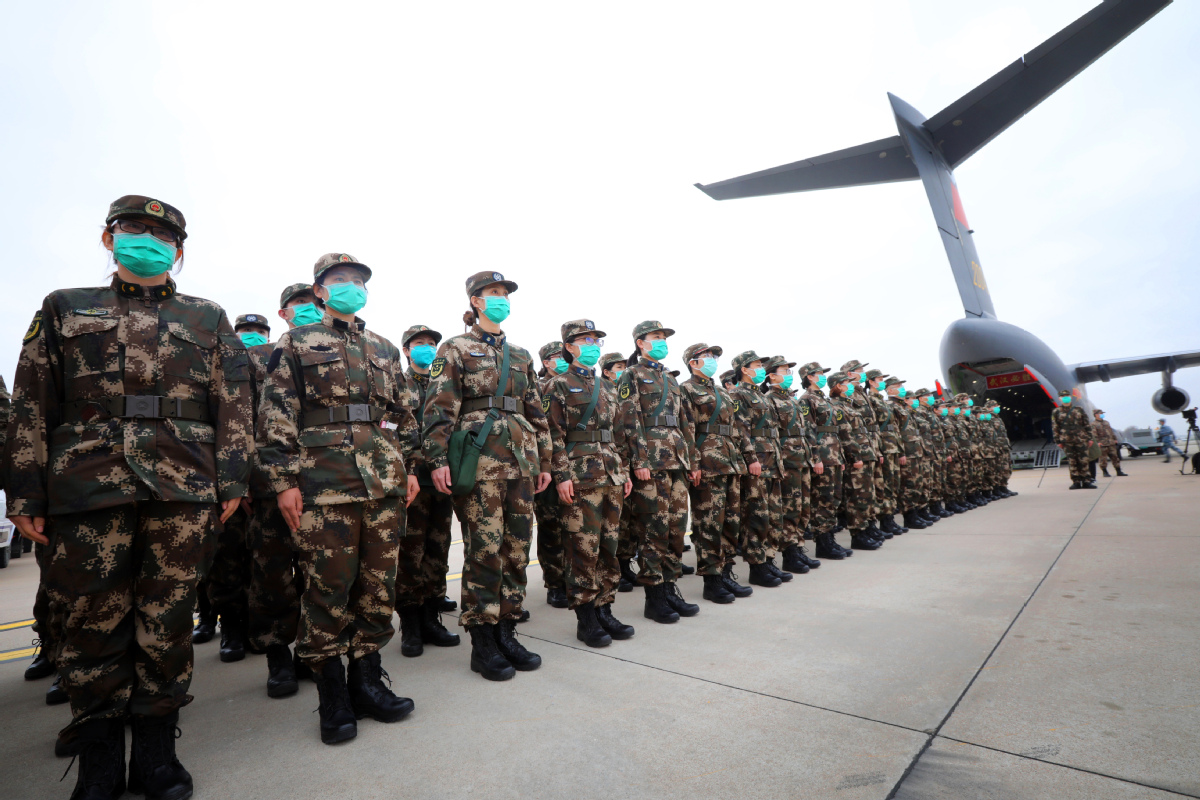
Support teams help transport supplies
Editor's note: Novel coronavirus pneumonia is posing a worldwide threat. Here, we take a look at how China is playing its role in the global fight against the outbreak by mobilizing a vast amount of resources to contain the epidemic. This is the fifth part of a series titled "United Actions".
Wang Huan spent 18 hours walking and traveling by taxi, electric motorcycle, airplane and even police car to reach her workplace in Wuhan, Hubei province, on Jan 26, the third day of the Spring Festival holiday.
The 22-year-old nurse's decision to return to her job at a military hospital was made on the first day of the vacation after the facility appealed for staff members to voluntarily return to work.
Wang also saw on her phone that many of her colleagues had responded positively to the call in her department's chat group.
Sitting at home in Siping, Jilin province, Wang texted her friend Shu Chun, a fellow nurse at the General Hospital of the People's Liberation Army Central Theater Command, to discuss what they should do. Both agreed they should return to their jobs in Wuhan as soon as possible.
However, because of the lockdown enforced in the city on Jan 23, all air, rail and bus services to Wuhan, the epicenter of the novel coronavirus pneumonia outbreak, had been suspended.
The pair came up with a solution-they would meet in Shu's hometown in Yifeng county, Jiangxi province, and hire a local driver to take them to Wuhan.
First, Wang bought an air ticket from Changchun, capital of Jilin, which is more than 150 kilometers from her hometown, to Nanchang, capital of Jiangxi.
She left home at about 5 am on Jan 26 to catch the early morning flight from Changchun airport. There were only 10 passengers on the plane.
At Nanchang airport, Wang was told by a taxi driver that she must pay extra, or he would not take her. This was because her phone number was registered in Hubei and the driver believed she was from that province.
After the two nurses met in Yifeng county, they quickly realized that no taxi or ride-hailing service driver would take them, even though they said they were willing to pay 3,000 yuan ($431) for the four-hour ride to Wuhan.
They had no choice but to drag their luggage to the nearest police station in the hope of getting help. Officers at the station suggested the nurses should go to the county police bureau to see if they could get assistance there.
The two trekked toward the bureau without seeing any private cars on the streets, let alone a taxi.
Just as they thought that all hope had deserted them, two shared motorcycles came into view.
"I was thinking it would be great if we could take them all the way to Wuhan," Wang said.
"Finally, we reached the police bureau in Yifeng and told the officers we were workers at a military hospital in Wuhan and had to return to our positions that day."
The bureau chief relayed their request to the county government, which approved it and authorized police officers to drive the pair to Wuhan.
Four hours later, a police car dropped them at a highway checkpoint on the outskirts of the city, where they were picked up by a car sent by their hospital.
Since their return, Wang and Shu have been busy nursing patients infected with the highly contagious disease.
"If the epidemic had not occurred, we would just be nurses, but because of the outbreak, we now feel more like soldiers," Shu said.
On Feb 14, Shu wrote in a WeChat post of her determination to continue the fight against the virus. The post received many "likes", including one from her landlady in Wuhan, who wrote: "I can't do anything for you, but I will cancel your rent for the next three months. Take good care of yourself."
Knowing that medics face a high risk of infection, Shu's parents message her every day, telling her to be careful at work. However, she said she is not daunted by the virus.
"As soldiers, we will never be quitters or deserters. This is exactly the time for us to come forward. If we don't, who will?" she said.
"My 14-year-old sister asked me when I would return home. I told her that it would be in the spring."









